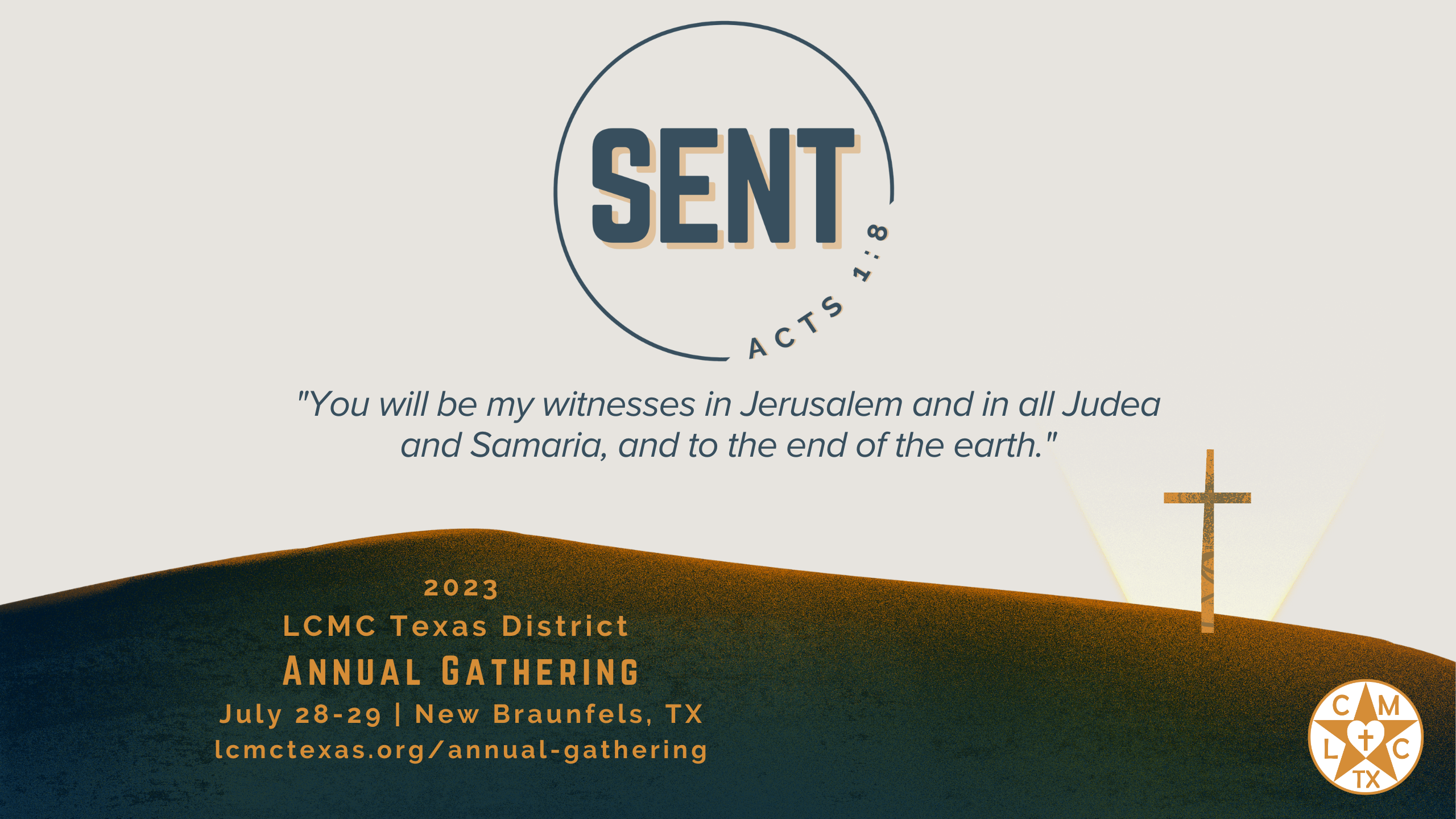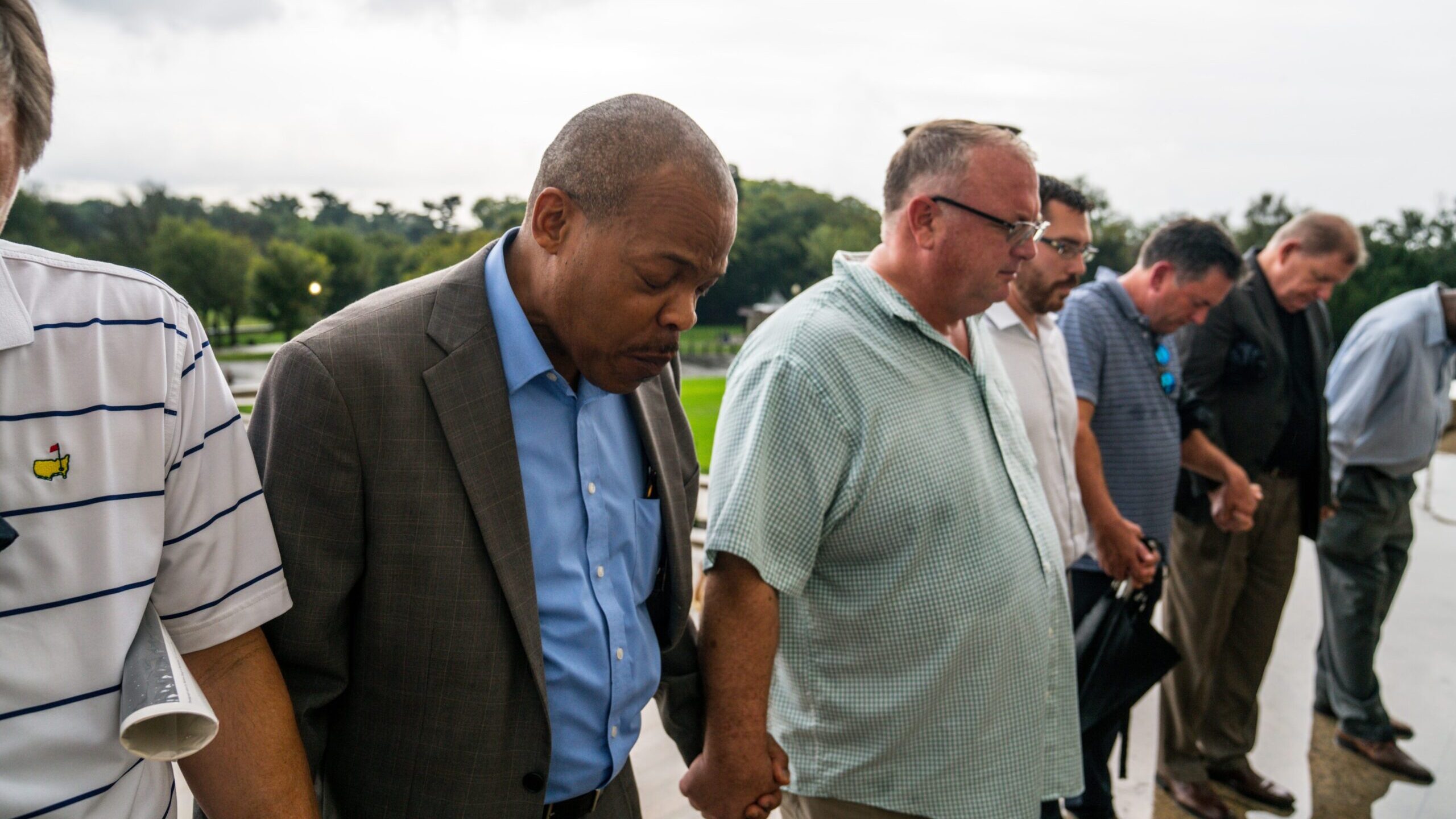Posted on Aug 31, 2023 in Mission Moment |
As I sit down to write this article, my mind is full of all the last-minute arrangements that are yet to be completed for our 2023 District Gathering in New Braunfels, Texas. Yet as many of you read this, the Gathering itself will already be in the rearview mirror. I am praying for a wonderful Gathering that inspires and empowers God’s people to be SENT by Jesus to be his witnesses in the world!
Our theme this year is SENT and is derived from Jesus giving the Great Commission in Acts 1:8, “You will be my witnesses in Jerusalem, and in all Judea and Samaria, and to the end of the earth.” It is my firm belief that the church is defined by its mission. We do not simply occupy space in this world while consuming resources. We are SENT by Jesus for a mission! The challenge is for each person, and every congregation to discern what that looks like in your day-to-day life in your community and context.
I would like to invite you to take inventory of all the activities that occupy your day-to-day life, both personally as well as for your church. Typically, our lives are filled with those activities that could be broadly categorized in one of three groups: activities required to sustain life, the things that we enjoy, and then everything else! While it may be worth analyzing the stewardship of all three categories, it is this third that needs our greatest attention.
Posted on Jun 27, 2023 in Mission Moment, Uncategorized |
Each year one of our highlights as a District is to come together for what we call our Annual Gathering. If you’ve been before, then you know what a treat it is! LCMC Texas has Gathered each summer since it’s inception in 2009 with only one exception in 2020. On July 28-29, our District will gather for the 14th Annual Gathering at St. Paul’s, New Braunfels! I hope you will make plans to join us this year!
Our theme for the 2023 Gathering is SENT, based on Acts 1:8. As Jesus gathered with his disciples in his final moments before ascending into heaven, he sent them out saying “…you will be my witnesses in Jerusalem, in all Judea and Samaria, and to the ends of the earth.” What does it look like to be sent by Jesus in 2023? What does your Jerusalem, Judea, Samaria, and ends of the earth look like for you and your congregation as you respond in faith to Jesus’ commissioning?
We are privileged to welcome Pastor Tilaye Daba to be our keynote speaker this year. Tilaye is the Director of the Global Mission Society for the largest and fastest growing Lutheran church body in the world: Ethiopian Evangelical Church Mekane Yesus. He has dedicated his life to the mission of Jesus and been a leader in evangelism and theological education.
Posted on Jun 27, 2023 in Mission Moment |
Four years ago, a group of pastors began dreaming about what it might look like to create an online ministry training program that was affordable, accessible, and effectively equipped those God was calling to greater ministry with a solid biblical and theological foundation while emphasizing practical mission and ministry instruction. After all, if we were ever going to plant and revitalize churches, we needed to invest in developing more mission-minded leaders. These conversations eventually led to the Texas District’s most ambitious project to date: Harvest Workers!
The program we set out to develop was not intended to be a seminary. Instead, we envisioned a ministry training program for those for whom traditional seminary might not be affordable, accessible, or the best fit. Harvest Workers actually inverts the emphasis of most seminary programs: instead of emphasizing academic studies in Bible and theology while providing a basic introduction to practical ministry, Harvest Workers introduces students to biblical and theological studies while diving more deeply into a wide variety of practical courses in mission and ministry.
Posted on Jun 27, 2023 in Mission Moment |
One of the things that I love the most about my job is when I get invited to walk alongside congregations in pastoral transition. When a church council or call team asks me to share my thoughts on best practices for a good call process, one piece of advice seems to surprise them more than any other: Do not ask “What do we want in a pastor?”
As I speak these words, exasperated church leaders stare back at me and occasionally someone gives voice to the look on their collective faces: “How else are we supposed to figure out what to look for in our next pastor?!?” The answer lies in the sage wisdom passed down from generation to generation in understanding the difference between wants and needs.
Parents of young children learn to make this distinction with their sons and daughters. At some point we all learn the hard truth that we don’t always get what we want in life. Instead, we should rejoice and give thanks to God as he provides for our basic human needs. In our faith communities we are reminded of God’s goodness of provision as we pray and ask him to do it again in the Lord’s prayer: “Give us this day our daily bread.”
Posted on Apr 3, 2023 in Mission Moment |
On Sunday, February 26 at 3:28 p.m. I got the kind of phone call that every parent dreads. My youngest son was calling… for a second time. I was in Zoom meeting and had ignored his first call. In our family, we have a code: if the first call goes unanswered and it is an emergency, call back a second time.
“Dad, I’m pretty sure my car is totaled. I’m really sorry.” My heart stopped. “Are you okay?” I asked. He replied, “I’m okay, but I’m pretty sure the car is totaled!” I responded, “I don’t even care about that right now, as long as you are okay!” He later was able to describe what happened, that another car lost control around a curve and came into his lane and collided with him head-on.
Oh, how it could have been so much more tragic! I really love cars, and I loved my son’s car, but I would much rather mourn a car than my son! Even though he faces lingering challenges of whiplash and the hassles of replacing his car, the main thing is that he was alive…and he was loved and cared for by his mother and father!
Posted on Apr 3, 2023 in Mission Moment |
Recently I have had several conversations about finances that have led me to think more deeply and biblically about the subject. Even though the financial realities of investing over the past year and a quarter have been less than enjoyable, I thoroughly enjoy personal finance. I also take great pride (undoubtedly sinfully so) in being a good steward of God’s resources. As a full-time church worker, I am ever mindful of spending the resources entrusted to our ministry with great care. I have pridefully shared with others how much we do together as a district with how little resources we spend doing it like it is some sort of badge of honor.
While my sin of pride is something I need to confess and repent, good stewardship of kingdom resources is indeed a good thing. But I recently realized just how stark the difference in mindset can be between personal and ministry finances. In the name of good stewardship of precious resources, we in the church tend to strictly guard the financial resources entrusted to us. When dollars are spent, we often see it as kissing them goodbye! If this is the case, it is no wonder we think twice before parting with these dollars!
Posted on Apr 3, 2023 in Mission Moment, Uncategorized |
In my work for the Texas District, I have the privilege of sharing about our association and have often been invited to give a presentation about LCMC. One of the questions that I have been repeatedly asked over the years I just love to answer: “Where do your pastors come from?” My answer: “Well pastor trees, of course!!” After a good chuckle, we then engage in an important conversation that many congregations have neglected for far too long. What my tongue-in-cheek answer points out is that the initial question presumes that pastors are “produced” from some external source. This line of thinking is problematic.
Many Lutherans in well-established American denominations have relied heavily on church camps and campus ministries to speak into young people the calling of God to vocational ministry. Over twenty years ago, a study of first-career seminary students in one Lutheran denomination revealed that the overwhelming majority personally experienced his or her call to pastoral ministry primarily through either a church camp or a campus ministry. While camp directors and campus ministers received this news as a great affirmation, it also exposed another weakness: a student’s home congregation was a far less significant factor.
Posted on Dec 19, 2022 in Mission Moment |
It is that time of year again! As we ring in 2023 full of hope and anticipation, many will make New Year’s resolutions, resolving to improve one’s life by committing to new healthy habits. While diet and exercise are the most common and talked about, resolve this time of year is often ambitious and can touch many other aspects of life, including spiritual things. Each year, Christians make fresh commitments to bible study, prayer, worship, volunteerism, generosity, sharing faith, etc.
Now I ask you to consider an invitation. Unlike a lot of New Year’s resolutions, this invitation doesn’t demand significant life adjustment, but rather one small to medium-size step: schedule a time away to spend with Jesus and others. Jesus himself modeled this pattern with his disciples, perhaps most famously in the story of his Transfiguration when he went up the mountain with Peter, James, and John. So that’s it: take a retreat away for unhurried time to connect with God and your brothers and sisters in Christ to simply be present with your Lord and one another. Pretty simple, right?!?
Posted on Dec 19, 2022 in Mission Moment, Uncategorized |
I recently attended PLI Leadership’s Discipleship to Missional Community (D2MC) training and was asked this question: “How do you view the world?” That’s not something any of us probably think about apart from being specifically asked! The presenter went on to describe two common perspectives that Christians typically adopt and proposed a third one that might better reflect the life of a disciple of Jesus.
GOD ⬅️ YOU ➡️ WORLD
We are tempted to understand the world simply as the forces that oppose God. God is on one side, the world is on the other, and the Christian is in the middle. With this worldview, you find yourself in the tension of either turning towards God or towards the world. This is the whole devil on one shoulder and angel on the other sort of picture! This perspective leads Christians to see the world as dangerous and develop a separatist culture to better reflect the life that we believe God is calling us to live. Unfortunately, this approach makes it difficult to share Jesus with the world.
Posted on Nov 3, 2022 in Mission Moment, Uncategorized |
Since the earliest days of the church, followers of Jesus have struggled with division and disunity, so it does not come as a surprise when we encounter it in the church today. It is common for me to visit a church and hear members speak with envy about what the other churches in their community are doing. And I get it: I have spent countless hours strategizing how my church could gain in “market share” so to speak! Too often we view our church in competition with others.
It is easy to see how this disunity and division must grieve God, especially the attitudes that seek gains for one congregation at the expense of another! But I also see that God may be at work in a mysterious way through our earthly divisions. I profess a Lutheran faith because I believe it to be faithful and true as I read scripture. But I also know faithful Methodists, Baptists, Catholics, Anglicans, and others who would earnestly say the same thing about their faith. And I do not think that it is God’s desire that we lock ourselves in a room together until we have hashed out an agreed upon faith so that there would be just one church on earth! Instead, the diversity of the church might be a part of God’s plan to reach the masses.












